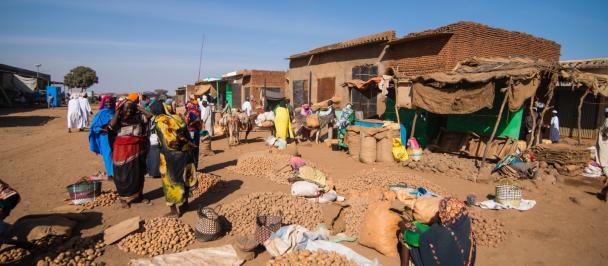Across Sudan, peace-building systems are bringing women together as they drive social cohesion and peace
July 28, 2024

Just last month, a group of young women from Kassala town participated in a two-week training workshop on food processing and bakery skills. And though these women represented an array of tribal backgrounds, they all committed to training other women in their home communities on the skills they acquired. Upon completing their training, they were provided with startup kits that include ovens, utensils, flour and oil—tools that can help them start their own enterprises at the same time they disseminate their learnings.
It may not be evident on first glance. But community actors like the women help create the pockets of social cohesion that will support the infrastructure for durable peace in the future—a durable peace that can heal cleavages and confront polarization.
This is only one example of what strengthening local peacebuilding systems looks like.
Peacebuilding and Durable Solutions is one of UNDP Sudan’s three crisis offer pillars, intended to strengthen peacebuilding systems by investing in cohesion to strengthen Sudan’s social fabric that will support the infrastructure for peace—employing an approach that encompasses community actors and civil society, from the local to the state and regional level.
The training workshop is a product of the Strengthening Capacities for Peace and Social Cohesion project—a joint initiative implemented in collaboration with UNICEF and funded by the UN Peacebuilding Fund—which aims to reduce violent conflict as well as enhance peace and social cohesion, thereby contributing to both social stability and sustainable development. The “Strengthening Capacities for Peace” Project aims to de-escalate mounting tensions to prevent and reduce violent conflict within five localities in two states.

It is designed to contribute catalytically to sustainable peace by strengthening community-based conflict and dispute resolution mechanisms; specifically for conflict prevention, peacebuilding and mediation, as well as to foster inclusive dialogue processes.
The “Strengthening Capacities for Peace” Project as a whole has yielded significant gains in support of broader peacebuilding. Community-Based Reconciliation Mechanisms (CBRMs) have been established and activated in two Sudanese states, providing members with training to effectively address tensions between host and internally displaced persons (IDPs) while also establishing links with local police stations to mediate cases referred to them for resolution. Additionally, more than 20 dialogues and town hall meetings were convened across five localities to address hate speech and hate crimes. Youth peace ambassadors were selected and trained in comprehensive training in peacebuilding, social cohesion, mediation, and conflict resolution. And 21 Village Saving and Lending Associations (VLSAs) have been established in five states, with income generating plans anticipated as capital increases.
Additionally, with the necessity for women to be represented and to participate in future peace initiatives, the Project prioritized women’s participation in conflict resolution as well as gender equality and women’s economic empowerment. 35% of the members in the CBRMs were women (a high figure given the environment). 46% of the participants in the dialogues and town halls were women. 50% of Youth Peace Ambassadors were women. And women made up 92% of the participants in the VLSAs.
The workshop on food processing and bakery skills training was organized by the Sudanese Red Crescent and supported by the UN Peacebuilding Fund; as well as UNDP Sudan, which is committed to Staying and Delivering in Sudan, supporting the people of Sudan by continuing its development mission in the country.
The remarkable and resilient women who participated in the workshop can take their newfound skills, and their spirit of collaboration and cohesion, to become agents of peaceful social cohesion upon returning home from the training.

 Locations
Locations



